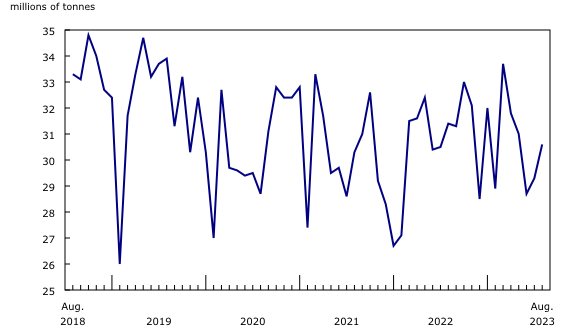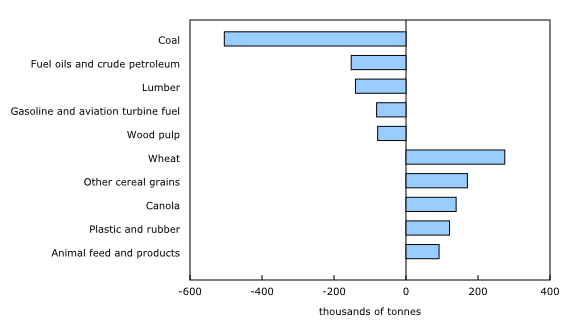Railway carloadings, August 2023
Released: 2023-10-24
30.6 million metric tonnes
August 2023
-2.4% 
(12-month change)
Highlights
In August, Canadian railways transported 30.6 million tonnes of freight, down 2.4% from August 2022 levels and marking the fourth consecutive month of year-over-year decline.
The overall freight volume in August 2023 was just below the five-year average of 31.5 million tonnes for this month. While shipments of containers and certain energy products were down significantly, carloadings of some agricultural and food products registered strong gains.
To further explore current and historical data in an interactive format, please visit the "Monthly Railway Carloadings: Interactive Dashboard."
The decline in total freight carried in August reflected lower volumes across all types of rail operations: non-intermodal loadings (mainly commodities) and intermodal loadings (mainly containers), as well as freight traffic from connections with American railways.
Intermodal traffic leads decline
Intermodal shipments originating from Canada led the overall decline in freight for the second month in a row in August, falling 11.6% year over year to 2.9 million tonnes. Container volumes have declined year over year for nine straight months, and August was the second-lowest volume recorded for this month in seven years.
The August decline may reflect a weakening of demand for imported goods, as Canadian international trade data reported that imports of consumer goods fell 7.7% year over year in August.
Energy carloadings continue to dampen volumes
In August, non-intermodal freight loadings in Canada edged down 0.8% year over year to 23.9 million tonnes, driven by sharp declines in some energy-based commodities.
Loadings of coal declined 14.2% (-505 000 tonnes) year over year in August, the second-largest drop in the last year.
Similarly, loadings of fuel oils and crude petroleum, on a downward trend since June 2022, decreased 15.3% (-152 000 tonnes) in August 2023 compared with August 2022 levels. Meanwhile, loadings of gasoline and aviation turbine fuel were down 27.2% (-82 000 tonnes), their sixth monthly decline in a row.
These rail movements mirror the nearly 20% decline in Canada's exports and imports of energy products, as reported in August's Canadian international merchandise trade.
Wheat, canola and other cereal grains remain strong
The tonnage declines in August 2023 were mostly offset by increases in carloadings of agricultural and food products, particularly grains. Wheat led the increases, with loadings rising by 24.9% (+274 000 tonnes) year over year in August, the smallest gain in tonnage in 12 months, as rail volumes from 2022's bumper crop started to wane.
Loadings of other cereal grains rose sharply in August by 89.4% (+171 000 tonnes) from August 2022, while loadings of canola were up 76.0% (+139 000 tonnes), their 11th consecutive month of year-over-year growth.
American freight continues to decline
Freight traffic received from connections with US railways saw a year-over-year decline for the 12th consecutive month, down 4.2% to 3.8 million tonnes in August.
Note to readers
The Monthly Railway Carloadings Survey collects data on the number of rail cars, tonnage, units and 20-feet equivalent units from railway transporters operating in Canada that provide for-hire freight services.
Cargo loadings from Armstrong, Ontario, to the Atlantic Coast are classified to the eastern division (eastern Canada), while loadings from Thunder Bay, Ontario, to the Pacific Coast are classified to the western division (western Canada).
Survey data are revised on a monthly basis to reflect new information.
The data in this release are not seasonally adjusted.
The Transportation Data and Information Hub provides Canadians with online access to comprehensive statistics and measures on the country's transportation sector.
Contact information
For more information, or to enquire about the concepts, methods or data quality of this release, contact us (toll-free 1-800-263-1136; 514-283-8300; infostats@statcan.gc.ca) or Media Relations (statcan.mediahotline-ligneinfomedias.statcan@statcan.gc.ca).
- Date modified:


